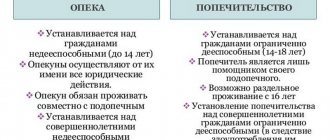Current legislation determines the possibility of obtaining guardianship for elderly people over 80 years of age.
This is due to the fact that citizens of this age, in most cases, are not able to independently serve their needs, and also, they cannot always control their psychophysical actions due to the natural aging of the body and the development of possible pathologies inherent in this age.
Most often, children are granted guardianship over their parents.
The legislative framework
The process of state support for citizens of retirement age is clearly regulated by current regulatory documents at the federal level.
The issue of old age guardianship is regulated by the following legislative acts:
- Civil Procedure Code of the Russian Federation dated November 14, 2002 N 138-FZ (as amended on December 19, 2016) (as amended and supplemented, entered into force on January 1, 2017) - information on guardianship of the elderly should be found in Articles 11, 29, 32, 35, 40, 41, 48;
- Federal Law of December 22, 2014 “On Guardianship and Trusteeship”;
- Federal Law of August 22, 2008 “On Social Services for Elderly and Disabled Citizens.”
The laws of the Russian Federation regulate the registration of guardianship over an elderly person
Basic terms
According to current regulatory documents, the concept of “guardianship” is characterized as one of the forms of protecting the rights of a citizen with the participation of third parties.
Guardians are given the opportunity to represent the rights of the ward, and they are also subject to obligations to provide for the citizen over whom guardianship has been established.
Guardianship can be issued both to a specific individual and to special organizations that provide care for the elderly for a certain monetary reward.
Initially, it is recommended to learn two basic concepts that will make it easier to familiarize yourself with legislative documents.
They are shown in the table below.
| Term | Description |
| Senior citizen | An individual who has reached the age of 80. While the status of “elderly” is assigned to citizens who have reached 60 years of age, and persons over 90 years of age are long-livers |
| Incapacity | Loss of ability to independently serve one's needs and make decisions |
There are two forms of establishing guardianship for citizens over 80 years of age.
These are:
- Full guardianship is established if an elderly citizen has mental disorders. In this state, they are not able to realize what is happening around them, what actions they are doing and what consequences this can lead to. The court deprives such persons of their civil rights by establishing guardianship;
- Patronage is prescribed for citizens who have a serious physical condition, which does not allow them to independently provide for their own life activities.
Before formalizing guardianship of an elderly person, you need to assess your moral, volitional, psychological and physical strength, since caring for an elderly person over 80 years of age requires a significant expenditure of effort and nerves.
Who can become a guardian for a disabled person?
In order to become a guardian, a person must meet certain criteria:
- reaching the age of 18;
- full legal capacity (the absence of a judicial decision that has entered into legal force declaring a citizen incompetent or limited in this state).
- the absence of a judicial decision regarding the candidate that he is deprived of parental rights;
- not registered with the PND;
- not being in a same-sex sexual relationship.
Since caring for a disabled person requires high moral qualities, guardianship authorities proceed from the following circumstances:
- moral qualities of the guardian (the law does not list what is included in this concept, therefore the authorized body is obliged to be guided by the generally accepted moral criteria in society);
- the relationship between the child and his guardian (relations of blood connection, properties of the relationship), the law does not determine the priority of blood connection over the others;
- the desire of the child (if this can be taken into account), the attitude of the guardian towards the child.
What does guardianship provide?
The legislator does not provide for privileges for the care of a guardian: the guardian cannot own the things of the ward at his own request, and cannot be the subject of inheritance. He represents the interests of the ward.
Who is under guardianship?
According to current legislation, the appointment of a guardian is possible for persons who have the following disabilities:
- Mental disorders - established only if the elderly person is unable to independently make adequate decisions and control their actions;
- The physical state of health does not allow one to function independently and requires the help of third parties.
The person under guardianship is not deprived of legal capacity. The powers of guardians are determined on the basis of the factor by which social protection is established.
Features of guardianship for the elderly
Civil legislation provides for the following forms of assistance:
- full guardianship over a person who is unable to account for his actions and sensibly assess what is happening, with recognition of his incompetent status in the judiciary;
- patronage, which provides periodic assistance in performing complex everyday tasks, fulfilling the instructions of an elderly citizen who is aware of his actions and is of sound mind.
It should be understood that this act has certain consequences, imposing important obligations and responsibility for the well-being of the ward. You have to take the issue seriously, weighing your capabilities and desires before contacting the official authorities to obtain guardianship.
It is necessary to have sufficient physical strength, be psychologically stable and morally prepared to perform actions within the framework of guardianship.
It is necessary to have sufficient time to provide care, carry out certain tasks, and take care of the ward. If a person does not have such resources, one should find another option for providing assistance to the elderly, for example, entrusting it to another person, organizing care with outside help.
You should evaluate your strength in performing the following duties:
- Providing the needs of the person under care.
- Making regular utility payments.
- Taking care of needs, care.
- Organizing treatment, completing a rehabilitation course, purchasing medications.
- Representation of interests in official authorities, performance of actions for the ward of a personal and property nature.
- Making important decisions for an elderly incapacitated citizen.
The law allows for exemption from work duties; unemployed people can receive guardianship over the elderly, because fulfilling their duties requires a lot of time and takes energy. The condition for registration will be working age, and if necessary, the time of care can be entered in the work book in the form of length of service and counted to the caregiver.
In the absence of official income, the guardian issues the required social payments as compensation for the performance of duties.
When older children are faced with the need to provide care for their parent, they often choose a form of foster care. If the help of outsiders is involved, the action must be agreed upon with close relatives, but permission from them is not required.
Criteria for a guardian of an elderly person over 80 years of age
The right to act as a guardian of a pensioner is granted to relatives or any other citizens. However, it must comply with the requirements defined by current regulatory documents.
In most cases, children establish guardianship over their parents, but only upon reaching the age of eighteen and having full legal capacity.
Each candidate for guardianship must meet the following requirements:
- Have a level of earnings not less than that established by legislative documents, which will need to be officially confirmed;
- Reach the age of majority;
- Have his own living space (even if he plans to live together with the ward);
- Have a certificate of absence of mental disorders;
- Be fully competent;
- Obtain permission for guardianship;
- If the ward has legal capacity, then it will be necessary to obtain his consent to establish guardianship in writing;
- Have an official place of employment;
- No criminal record;
- No alcohol or drug addiction;
- Do not have serious pathologies (malignant tumors of stages 3 and 4, tuberculosis).
In addition, each candidate guardian must undergo special training courses.
Guardianship of an elderly person 80 years old - registration rules and features
Family Law {amp}gt; Guardianship{amp}gt; How to become a guardian for an elderly person?
Quite often it happens that circumstances force constant control over the actions of a certain category of people, since for health reasons they cannot independently manage their property.
Then there is a need to formalize guardianship over them. In accordance with the legislation in force in the Russian Federation in 2021, this procedure can be carried out under the guise of patronage or in full.
Many relatives help grandparents completely free of charge. Few people know that when caring for an elderly incapacitated person, the guardian can receive a certain amount of remuneration from the state.
Therefore, it is important to understand how to obtain guardianship over an elderly person and study all the nuances of this process.
Each type of guardianship, when formalized, implies a certain list of rights and obligations in relation to the person over whom guardianship is carried out.
Guardianship of elderly people is established by the guardianship and trusteeship authorities. The method of registration and the rights of the guardian will depend on the decision they make.
According to the generally accepted classification of the population by age groups, elderly people include citizens over 60 years of age.
The elderly period lasts until 74 years. Then old age begins, it covers the age of 75-89 years. Those who are 90 years of age or older are classified as centenarians.
There are two ways to establish guardianship over elderly people:
- Full custody.
- Patronage care.
Full guardianship is established in the case when an elderly person cannot act consciously and adequately, is unable to control his actions due to a mental disorder.
Such citizens are recognized by the court as partially or completely incompetent. After a court decision, partial or full guardianship is recognized over incompetent people.
Then the necessary documents are drawn up and all actions will be performed by the guardian on behalf of the elderly citizens.
The guardianship and trusteeship authorities will entrust the person who has assumed the responsibilities of a guardian with the function of managing pension funds and other benefits for older people to meet their needs.
We invite you to read: Hunting in Kaliningrad begins
Patronage is established for elderly people who cannot fully realize their rights and responsibilities due to illness or disability.
To apply for it, the pensioner needs to write an application requesting patronage and submit the corresponding conclusion of the medical commission.
Guardianship of an 80-year-old elderly person can be assigned in full even without establishing incapacity.
Thus, the age at which guardianship can be granted is of great importance.
Patronage or full guardianship of an elderly person after 80 years of age does not require recognition of incapacity by the court. Until the age of 80, guardianship is established only if there is a certificate from a medical institution declaring the person incompetent.
The Civil Code of the Russian Federation stipulates who can be a guardian of an elderly person after 80 years of age.
Not only relatives, but also strangers who wish to take on the responsibilities of providing for the pensioner have the right to formalize guardianship.
The presence of a family connection is not necessary, but the current regulations stipulate the criteria that the guardian must meet.
Basic requirements for someone who can become a guardian of an elderly person:
- Age of majority.
- Full legal capacity of a citizen.
- No alcohol or drug addiction, no criminal record.
- A person should not be deprived of parental rights.
- The applicant must have no serious pathological diseases.
- The guardian must have permission from the guardianship and trusteeship authorities based on the inspection report of the living space.
- The caregiver must have a job to provide a regular income.
People cannot obtain guardianship:
- With stage 1 and 2 tuberculosis diseases during dispensary observation.
- With any mental disorders and deviations in actions.
- With cancer stages 3 and 4.
- Infectious diseases during clinical observation.
- Injuries that led to disability of the first group.
To determine the above diseases, guardianship authorities refer the candidate for guardianship to a special medical examination.
If a pathology is detected, the procedure for establishing guardianship will be denied. After recovery, a person can again apply for registration.
It is important to take into account the age at which guardianship can be granted. The law allows this opportunity only for adults.
To obtain guardianship over an incapacitated person, you must prepare the following:
- Statement. The request for patronage is written by the applicant in his own hand. An application for consent to full guardianship is submitted only if the citizen is legally competent. In addition, another statement of desire to provide care from the future guardian or trustee is required. The application should indicate the details of both parties and the authorized body.
- Additional documents required. Their list is determined by federal law and is attached to the application.
List of documents that the trustee must submit for registration of patronage:
- originals and copies of passports of both parties;
- agreement between the parties;
- housing inspection report;
- conclusion about the health status of the caregiver;
- conclusion about the health status of the ward;
- a certificate from a tuberculosis clinic, as well as from a narcologist and psychiatrist;
- characteristics from work or educational institution;
- characteristics from the place of residence;
- autobiography.
All that is required of an elderly person is the following:
- application for patronage or consent to guardianship;
- identification;
- health certificate after a medical examination;
- decision on recognition of incapacity, if any.
The list of documents for registration of guardianship in full is a little more extensive, it is supplemented by the following papers:
- income certificate;
- certificate of no criminal record;
- consent of all family members.
In the regions, this list of securities may be changed or supplemented. It is better to clarify everything with the authorized bodies in advance.
The above documents, together with the application, are submitted to the guardianship and trusteeship authorities at the place of residence of the ward.
In accordance with the law, the guardianship authorities are given a certain period of time to check documents and make a decision; it is 1 month.
After receiving the decision, the parties must prepare an inventory of the elderly person’s property, as a result of which a document is drawn up in two copies.
When compiling it, witnesses who have no personal interest must be present. They put their signature under the inventory of property.
What does guardianship provide?
The rights and responsibilities of a guardian and the benefits they are entitled to are established by the Civil Code of the Russian Federation, the Law “On Guardianship and Trusteeship” and other regulatory documents.
We suggest you read: How to get your employer to pay your salary upon dismissal
A guardian has a wide range of rights that should be carefully reviewed before becoming a guardian for an elderly person who lacks legal capacity.
A citizen in such a state cannot independently exercise his rights, so a guardian does this on his behalf.
What does guardianship of an elderly person provide:
- The guardian has the right to live both with the ward and separately.
- When living together, the ward moves into the guardian's apartment.
- When the guardian does not have his own home, he can live with the elderly person under his care in his living quarters, but only with the permission of the guardianship authorities.
- The guardian of an incapacitated person has the right to make transactions in the interests of the ward without executing a power of attorney.
- The pension and other benefits of the ward are credited to the guardian's nominal bank account. The guardian can use this money in the interests of the senior citizen without the consent of the guardianship authorities. But he is obliged to draw up a report on the expenditure of such funds every year.
- The guardian can carry out any actions with the ward’s real estate only in his interests, having previously received consent from the guardianship authorities.
When registering guardianship in the form of patronage, an agreement is concluded between the parties, which spells out the rights and responsibilities of the guardian and the senior citizen.
This may be an agreement on trust management of property and similar agreements.
Basic rights and responsibilities of a nursing assistant:
- Carrying out instructions from the ward, both legal and everyday.
- Notifying the ward about the result of the execution of his instructions and requests.
- Disposition of the ward's property in his interests.
To avoid disagreements during the guardianship process, the responsibilities of the guardian should be detailed in the agreement with the older person.
It is imperative to indicate what type of housekeeping assistance the guardian will provide, how often he should do this, and where the ward will live.
The guardian has the right to receive compensation for the expenses he incurred while providing assistance to the elderly citizen.
The agreement between the parties may stipulate the guardian's remuneration for his services. It is paid by the ward. The patronage assistant is not entitled to any payments from the budget.
It is important to understand that the guardian of an elderly person has no rights to his inheritance if there is no will.
In addition, if a contract of agency has been drawn up, each party may terminate it at any time.
Thus, the scope of powers will depend on the basis for establishing patronage or guardianship.
Guardianship of an 80-year-old elderly person means that the citizen caring for him has the right to receive payment from the social insurance fund.
In this case, the guardian must not work officially, be of working age and have full legal capacity.
If these points are not met, payment cannot be assigned. In addition, it is important to consider that time spent caring for an elderly person is included in the work experience.
No less pressing is the question of how much they pay in 2021 for guardianship of an elderly citizen.
In accordance with the law, a person over whom patronage is assigned is entitled to an additional payment to his pension from the pension fund. Its size is 1200 rubles.
How much do carers pay for an elderly person?
The establishment of guardianship is carried out in the form of social protection if the warded citizen is recognized as having lost his legal capacity.
In addition to the fact that guardians are given the right to represent their wards, they can fully receive benefits from the Social Insurance Fund.
You can receive payments from the Social Insurance Fund only if the guardian is legally capable and able to work due to age, but does not carry out official work activities due to caring for the ward.
The period of caring for an elderly person over 80 years of age is fully taken into account when determining the length of service.
For citizens over whom patronage is issued, an additional payment from the Pension Fund of the Russian Federation is assigned in the amount of 1,200 rubles. It is appointed to pay for guardianship services.
And when guardianship is established over an incapacitated elderly person, a payment of 1,200 rubles is assigned, which the guardian receives from the Social Insurance Fund.
After social protection is issued, all rights and interests of an elderly person over 80 years of age are represented by a guardian. Also, he is endowed with the rights to dispose of the funds of his ward, but exclusively in the interests of the latter.
In addition, guardianship involves paying the following expenses of the elderly:
- Payment of housing and utility bills;
- Purchase of food and non-food products, medicines, clothing, etc.
It is important to understand that state law does not specify any payment for guardianship or patronage. However, the ward can sign an agreement on voluntary payment for the services of the guardian.
The ward can sign an agreement on voluntary payment for the services of the guardian.
What responsibilities does guardianship of an incapacitated elderly person entail?
A person who obtains guardianship or patronage acquires certain rights and assumes certain responsibilities. In particular, he is given the right :
- Speak on behalf of the ward at court hearings;
- Take care of him, maintaining his health;
- Place him in a hospital or other facility if caring for him at home is not possible.
The responsibilities of the trustee include:
- Caring for the well-being of the person under care;
- Implementation of measures to expand its capabilities;
- Expense of funds that an old person receives solely for the purpose of ensuring a comfortable life;
- Notification of specialized authorities about a change in the place of residence of an incapacitated citizen.
In the case of establishing patronage, the relationship of the parties is sealed by an agreement in which certain mutual rights and obligations can be fixed.
The relationship between a guardian and his ward is based on the following principles.
- They can live together. It doesn't matter whose property the living space is. However, in order to live in the ward’s house, the person who is looking after him must obtain the consent of the guardianship authorities.
- The citizen who has formalized guardianship now acts on behalf of his ward. Moreover, his actions should always be aimed exclusively at the benefit of the person under his care.
- The money that the pensioner receives from the state goes to the trustee's account. At the same time, he must annually submit a report to specialized authorities on how the funds were spent to confirm that all expenses were made only to meet the needs of the ward. All these actions are usually prescribed in the contract. How correctly he can fulfill them depends on how clearly his rights and responsibilities are formulated. To avoid possible disputes, it is worth discussing in detail all important points.
Benefits and benefits. If caring for an elderly relative is provided by an able-bodied person who cannot simultaneously engage in his professional activities while caring for him, he is entitled to an allowance. To do this, you need to fill out a special application form. In this case, the person will not receive unemployment payments and pensions. For each old person, this benefit is calculated separately in full.
Read material on the topic: Diseases of the elderly
Responsibilities of a Guardian
Initially, you need to understand that establishing guardianship is voluntary and is a right, not an obligation. No one has the right to force guardianship.
And the registration process itself is quite long, which requires patience and adherence to the rules.
The legislation defines the following obligations that guardians must fulfill:
- Support an elderly person over 80 years of age;
- Pay housing and utility bills for the person under guardianship;
- Caring for the elderly;
- Provide timely treatment for the patient;
- Protect the personal and property rights of the ward;
- Make decisions on behalf of the elderly regarding his life.
Under what conditions is patronage issued?
The Civil Code of the Russian Federation regulates the rules that must be observed when establishing social protection over elderly citizens.
These are:
- An individual who seeks assistance from third parties must not have mental disorders. This is due to the fact that in case of mental disorders, full guardianship is established;
- The candidate for ward and the patron (assistant) himself must give written consent to patronage;
- It is not allowed to establish patronage for social welfare workers who help elderly people over 80 years old at home;
- The right to become an accomplice is granted to a relative or third parties;
- Various agreements are concluded between both parties: agency agreements, assignments, trusts for property management.
The Civil Code of the Russian Federation regulates the rules that must be followed when establishing social protection over elderly citizens
How can a pensioner turn 80 apply for guardianship?
Before arranging guardianship for a person of retirement age, it is recommended that you familiarize yourself with the legislative part of this issue, as well as adequately assess your capabilities.
Each candidate must meet a certain list of requirements that are established in federal regulations.
Relationship is not a determining factor in the appointment of guardianship. Complete strangers can also receive this status if they wish.
The main features of guardianship for elderly people over 80 years of age are given below:
- The guardian may be officially unemployed in order to devote full time to the ward. However, the caregiver must be of working age;
- The full period of caring for the elderly is recorded in the official work experience;
- If the guardian is not employed, then he receives payments from the Social Insurance Fund for caring for the elderly.
How to make a payment
The organization responsible for assigning and transferring compensation for citizens providing care is the Pension Fund. The law provides for the possibility of providing assistance to several elderly persons at the same time. In this case, compensation is assigned for each ward.
Compensation payment is not assigned in the case of caring for a citizen who receives 2 pensions. The right to a second pension is given to military pensioners, firefighters, security forces, employees of the penal system, drug control services and the State Guard.
The law does not oblige a citizen caring for a pensioner to live with him.
List of documents
To receive compensation, the applicant must submit the following documentation to the Pension Fund:
- passport;
- statement of the citizen providing care;
- statement from an elderly person;
- information about lack of employment (work book);
- a certificate from the employment center stating that the applicant is not registered;
- civil passport and work book of a pensioner;
- conclusion of a medical commission on the need for constant outside care;
- certificate from the educational institution (for the student);
- certificate from school (for a student);
- parental permission (if the applicant is under 16 years of age);
- permission from the district guardianship department (if the applicant is under 16 years of age).
Employees of the authorized body must independently find out whether the pension was assigned to the applicant and whether the senior citizen has a second pension.
Amount of benefit and procedure for registration
The amount of compensation payment varies depending on the region of application. The basic amount is 1200 rubles. Depending on the regional coefficient, the amount may be increased.
A special feature of the payment is that the funds are not transferred directly to the recipient, but together with the senior citizen’s pension. The pensioner must independently transfer the payment to the caregiver.
Compensation is paid not only for the current month, but also for the previous period. The maximum period of claim for past time is 3 years if the pensioner has reached 80 years of age.
To receive the payment you must submit an application. The law provides for the following treatment options:
- in person to the district office of the Pension Fund;
- through the electronic portal of the State Service;
- with the help of a trusted person.
The application review period is 10 days. If the authorized body refuses to assign a payment, then an official refusal is sent within 5 days. The maximum period for correcting defects is 3 months.
If a pensioner moves to another district or city, the Pension Fund stops making payments at his request. The payment is assigned by the Pension Fund branch at the place of new residence from the 1st day of the next month.
The FIU office has the right to require the caregiver to update documentation.
List of documents
Each candidate for guardianship will need to fill out an application in a certain form - download link.
Then submit it to the local Department of Social Protection of the Population with the following list of papers:
- Applicant's passport (original and photocopy);
- Bilateral agreement;
- Certificates about the health status of each of the parties to the agreement (guardian and ward);
- A written description from the place of employment of the candidate for guardianship;
- Work book (original and photocopy);
- An extract from the house register, which confirms ownership of the living space;
- Certificate of registration at the place of residence;
- Conclusion based on the results of an examination of the guardian’s place of residence (two copies).
Documents for guardianship
How to make an application?
The application form must be filled out directly by the candidate for trustee.
The following information must be included in the document:
- Full name of the guardian;
- Passport details;
- Time limits for establishing guardianship;
- Conditions of detention of the ward;
- List of attached documents.
Application for guardianship
Registration of patronage is carried out according to a similar scheme, and the existence of an agreement with the conditions for the provision of such a service is additionally prescribed.
Application for establishment of patronage
Agreement on trust management of property of a citizen under patronage
Who controls the fulfillment of the conditions?
State guardianship authorities undertake to monitor the activities of the guardian in relation to his ward.
It is within the competence of government agency employees to visit and talk with the pensioner, as well as request reporting on the funds spent.
According to current legislation, a guardian does not have the right to use the ward’s financial savings for personal purposes. If misconduct is discovered, the guardian is deprived of his status without the possibility of ever becoming a trustee.









